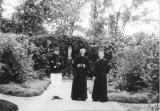sad days - more
The photograph is taken in the garden of Sacred Heart House in Saint-Quentin during World War I (1914-1918). On August 28, 1914, the city was occupied by the Germans. For more than thirty months, Fr. Dehon is forced to remain in Saint-Quentin, living, according to his own expression, in "a long retreat ," during which he writes his Spiritual Last Will and Testament, "the Heart of Jesus as a most precious treasure" leaving it to the Congregation.
In many letters Fr. Dehon "during these sad days of war in 1914" expresses his interpretation of the war (interpretation which resembles closely that done in the 1870/71 war between France and Prussia, but this time without any nationalist connotation):
"Our God punishes the people of Europe who all more or less need expiation and reparation. For us, religious, we must keep mutual charity. I think, as you do, that Our Lord prepares the reign of the Sacred Heart. A purification was necessary. The war will continue, because if it finishes too quickly, nothing would be changed." (Letter to Fr. Wiese, 26.12.1914)
Obviously Fr. Dehon is far from the interpretation and the condemnations of the war by Pope Benedict XV who sees in this conflict "a useless blood bath" (1.8.1917), a "suicide of civil Europe" (4.3.1916), "the darkest tragedy of human madness" (4.12.1916) and who fights vigorously an immoderate nationalism which he distinguishes from a simple love of the fatherland.
It is only faced by the disastrous results of the war, for example while turning back to Saint-Quentin after the war, that Fr. Dehon changes a little bit in his speaking and writing, although he will never arrive at the point of outright condemnation of the war (which might have led to a conflict with many confreres):
"I spent two days in the martyred city… It's a painful sight. The experience made me fall to the ground. I've never seen anything like it in my life, except perhaps Messina after its destruction. It's a mass of dirty, dismal ruins… Hardly any window, any piece of furniture, any gutter remained as it was before. It rains in the houses, plaster falls down from the houses... And our beautiful cathedral, without a roof, without windows, without altars, all its pillars perforated by holes from the mines!… The people who return, will they come back with some comprehension and some faith?" (NQT XLIII/1919, 99f)
